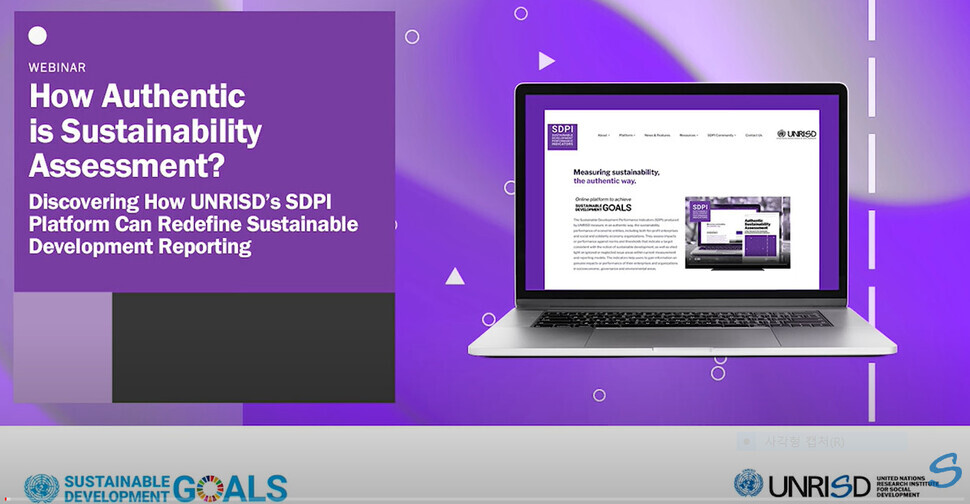hankyoreh
Links to other country sites 다른 나라 사이트 링크
How making ESG reporting mandatory serves the public and our environment alike

The codification of environmental, social and governance, or “ESG,” reporting standards into law appears imminent in the US and many European countries. Increasingly, South Korea is also finding itself impacted.
As of 2026, all listed companies in the US will be required to provide information on their financial statements about the financial impacts of climate-related risks and other information related to climate issues.
For instance, an information technology company with a data center storing customer and corporate information would be required to report power consumption on its statement when related costs rise due to electricity supply issues, along with the impact of this on operating profits.
Across the Atlantic, countries in the European Union have taken a step further. As of next year, they are requiring the disclosure of corporate information relating to all three ESG areas in business reports.
Going beyond the simple principle of “materiality” and consideration of the financial impact of ESG issues on the company itself, this marks the adoption of a “double materiality” principle requiring the reporting of corporation activities’ impacts not only in financial terms but also in human and environmental ones.
So while a listed IT company in the US can get by with disclosing environmental information and operating profit impact details associated with electricity supply issues, a European counterpart would be obliged to report the impact of its increased power consumption on the local energy situation and carbon neutrality goals. In other words, the European standards are stricter.
The European Sustainability Reporting Standards adopted by the EU in July 2023 also included Scope 3 greenhouse gas emissions, which extend to the entire corporation value chain. Scope 3 represents the most comprehensive standard when calculating emissions, and the question of their adoption is a focus of attention for industries around the world.
Under this approach, greenhouse gas emissions are calculated for everything from the companies’ production to consumption and disposal, including partner companies and distribution networks. Due to industry objections, Scope 3 standards were omitted from the US Securities and Exchange Commission’s climate-related disclosures and a draft on domestic ESG disclosure standards announced by the Korea Sustainability Standards Board last April.
But the EU’s ESG reporting standards that are being mandated as of next year will apply to around 49,000 companies within the region and account for an estimated 75% of sales by all EU businesses.
“You can’t manage what you don’t measure.”
Peter Drucker, who has become known as the “father of management,” stressed the basic business principle that corporate data cannot be managed or controlled when it isn’t measured properly. The same goes for ESG reporting standings.
Previously, different forms and methods of reporting were adopted for business reports, sustainability reports, websites, and other areas. This has made it difficult not only to collect ESG information but also to measure and assess it.
As a result, ESG announcements may be misused as tools for greenwashing (misrepresenting business activities as taking the environment into consideration), while critics have argued that they have not played a real part in achieving sustainable development goals (SDGs).
As a way of overcoming these reporting problems and limitations, the international community has recently been coming out with integrated reporting systems that reflect various standards.
Amid this trend, one gathering has stood out. On May 23 and 24, a United Nations Research Institute for Social Development (UNRISD) workshop was held at Concordia University in Montreal on the topic of “sustainability assessment initiatives.” This was a setting for comparative analysis of ESG reporting standards and discussing tasks for the achievement of sustainability goals.
Co-organized by the Own the Metrics campaign, Mondragon, the Predistribution Initiative, the Karl Polanyi Institute, and Concordia University, the event was attended by global ESG experts, businesspeople, and social and solidarity economy representatives from countries such as the US, Germany, Korea and Japan.
One of the co-organizers, Own the Metrics, is a global campaign that is working to reflect the voices of different stakeholders to break away from capital- and shareholder value-centered ESG reporting and achieve sustainable development goals. Working together with it are the American Sustainable Business Network, which boasts around 250,000 member businesses, and Social Economy Europe, a discussion framework for European social economy organizations.
The Predistribution Initiative is a non-profit organization with the aim of changing corporation- and investor-focused ESG investment structures so that wealth and influence are distributed to workers and communities.
The Spanish-based Mondragon is the world’s largest cooperative group, with around 257 participating businesses and 70,000 member individuals. It took part in the workshop as a representative of social and solidarity economy organizations.
The workshop participants agreed that many problems still have to be solved before ESG reporting standards serve as accurate assessments of companies’ impacts on sustainability.
Mark McElroy, the founder of the Center for Sustainable Organizations, explained that because current ESG reporting standards focus only on the difference in performance relative to the year prior, they are not suited to measuring long-term progress toward sustainability. He argued that the only way to properly gauge the achievement of sustainability is by measuring and reporting data in context after presenting sustainable development standards to be achieved (a sustainable development threshold), such as the Sustainable Development Performance Indicators (SDPI).

UNRISD developed the SDPI in 2021 as a way of evaluating companies’ sustainable development progress in context — including threshold levels — in order to resolve blind spots with the existing ESG reporting standards. In the case of an SDPI metric focusing on the proportion of female board members, a sustainable development threshold level of around 40% is presented, with sustainability assessed on a five- or three-point scale based on company data.
Ilcheong Yi, a senior research coordinator for UNRISD, explained, “The SDPI sets standards for companies to attain for the sustainability of the global environment, and company performance is measured and assessed so that the companies are able to contribute to sustainable development in a practical way.”
Some argued that the currently announced international ESG reporting standards are limited in their application to measure performance for social and solidarity economy organizations.
Eum Hyun-sik, the research director for the International Cooperative Alliance, stressed, “It’s important to measure and evaluate ESG performance by cooperatives, which are founded to practice social values and sustainable development.”
“But the value that cooperatives contribute to workers and communities is not reflected in the current financial capital-based reporting standards, so they end up not being properly assessed,” he added.
Others at the workshop argued the need to support smaller businesses that face a serious burden with ESG reporting. They proposed that the government should provide ESG reporting education to encourage participation by the smaller businesses that account for most companies and jobs in domestic and overseas industries.
Some further suggested that the establishment of ESG reporting will require education to be provided not only to the companies responsible but also to the investors and other social stakeholders who will be the “readers” of reported data.
During a World Sustainable Development Summit held in September 2023, the UN secretary-general said that the rate of progress toward achieving the UN’s 17 sustainable development goals — which the international community pledged to reach by 2030 — was a mere 15%. He further stressed that achieving sustainable coexistence between human beings and the environment would require cooperation and effort from all areas of society, including governments, businesses, and civil society.
Currently, the ones leading the way in developing ESG reporting standards are global standard organizations such as the International Sustainability Standards Board and the US Securities and Exchange Commission. Workshop attendees agreed that for ESG reporting standards to guide companies in implementing SDGs, they should reflect the voices of social stakeholders, including representatives of unions and cooperatives.
Yvonne Zwick, the chairwoman of Germany’s Business for a Better Tomorrow Initiative, stressed that the participation of a few advanced economies and large corporations is not enough for companies to contribute to achieving sustainability targets.
In particular, she emphasized the need for reporting standards that take various regional environments and the characteristics of cooperatives and other small businesses into account so that different governments and different forms of companies can participate in sustainability practices.
Yi shared a similar opinion.
“The participation of different stakeholders is necessary for the expansion of ESG reporting standards beyond private for-profit businesses and into social and solidarity economy organizations,” he argued.
“One major task going forward will be to establish the kind of governance that allows for the opinions of experts, civil society, and various other stakeholders to be expressed in the ESG reporting discussions of global standard organizations,” he said.
By Park Eun-kyung, director of the Better Society Research Center at the Hankyoreh Economy and Society Research Institute
Please direct questions or comments to [english@hani.co.kr]

Editorial・opinion
![[Column] Balloons, drones, wiretapping… Yongsan’s got it all! [Column] Balloons, drones, wiretapping… Yongsan’s got it all!](https://flexible.img.hani.co.kr/flexible/normal/500/300/imgdb/original/2024/0623/9117191084517636.jpg) [Column] Balloons, drones, wiretapping… Yongsan’s got it all!
[Column] Balloons, drones, wiretapping… Yongsan’s got it all!![[Editorial] It’s time for us all to rethink our approach to North Korea [Editorial] It’s time for us all to rethink our approach to North Korea](https://flexible.img.hani.co.kr/flexible/normal/500/300/imgdb/original/2024/0621/7517189559819182.jpg) [Editorial] It’s time for us all to rethink our approach to North Korea
[Editorial] It’s time for us all to rethink our approach to North Korea- [Column] Why empty gestures matter more than ever
- [Editorial] Seoul’s part in N. Korea, Russia upgrading ties to a ‘strategic partnership’
- [Column] The tragedy of Korea’s perpetually self-sabotaging diplomacy with Japan
- [Column] Moon Jae-in’s defense doublethink
- [Column] S. Korea-China cooperation still has a long way to go
- [Editorial] Seoul must use tact and diplomacy to check deepening Russia-NK ties
- [Editorial] Thorough audit, evaluation of oil test drilling are needed
- [Editorial] Yoon prioritizes his administration over South Korea’s safety once again
Most viewed articles
- 1[Editorial] It’s time for us all to rethink our approach to North Korea
- 2[Editorial] Fortified N. Korea-Russia ties should be a wakeup call for Seoul
- 3Partners, allies or something else? How North Korea and Russia are framing new pact
- 4‘Stochastic parrots’: Abeba Birhane on how AI compounds harmful biases
- 5[Editorial] Seoul must use tact and diplomacy to check deepening Russia-NK ties
- 6S. Korea flouts UN body’s call for reparations for sex-trafficked Filipinas
- 7Samsung’s new strategy swaps tech breakthroughs for a focus on customer service
- 8Hot weather hat trick to send the mercury soaring in Korea
- 9‘It’s actually a system where Choi Sun-sil tells the President what to do’
- 10Romance between Yemeni refugee and Jeju woman blossoms into marriage